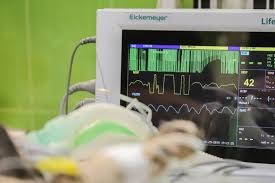Pets are usually part of the family; seeing them struggle when they are not well is incredibly tough. Dilated cardiomyopathy in dogs is one of the more serious heart conditions that dog owners must deal with; however, its sneaky signs can go unnoticed. This condition occurs when the heart muscle weakens and stretches because it works harder than usual to pump blood. Sometimes, it can lead to heart failure. Most dogs can happily and actively live with the proper care and early detection at the veterinary hospital.
Understanding Dilated Cardiomyopathy in Dogs
Dilated cardiomyopathy in dogs is known as DCM for short. It is a heart problem that impacts dogs and can be risky. The illness results in the enlargement of the heart’s cavities, and the wall muscles becoming thin, reducing the heart’s efficiency at pumping blood.
DCM is like other heart conditions in that it gradually worsens over time. Undetected for years until the final stages, some signs become noticeable. In the case of advanced DCM, symptoms are a persistent cough, chronic tiredness, difficulty in breathing, fainting, and an abdomen distended with fluid. The sudden, effortless change is what makes DCM threatening. With DCM, dogs can seem perfectly healthy one day and be in heart failure the next. Regular vet check-ups can help manage DCM before it reaches a critical state.
Why Choosing the Right Veterinary Hospital Matters
Not all clinics have the same facilities, and when it comes to managing complex issues such as canine dilated cardiomyopathy for dogs, having appropriate resources and expertise matters. With these resources, such as a highly trained veterinary cardiologist, echocardiography, and electrocardiograph imaging systems, the outcome can greatly improve at the veterinary hospital.
A fully equipped veterinary hospital’s most distinguishing mark is its capacity to identify the initial, often hidden signs of heart disease. An instance is a subtle modification in your dog’s breathing or a decrease in physical activity – with the appropriate clinical tests, vets can ascertain if there is a more serious condition. Such action can assist in evading the more advanced stages of the disease, which are much more challenging to treat.
Symptoms You Shouldn’t Ignore
As a pet owner, you are likely among the first people to notice if anything is different and unusual. Many symptoms differ from one dog to another, with a few distinctive ones that could indicate a heart problem:
- Tiring easily during walks
- Persistent coughing, especially at night
- Fast or difficult breathing
- Decreased appetite
- Passing out or collapsing all of a sudden
- Pot-bellied look due to fluid accumulation
If these symptoms are present, have the dog examined immediately at the veterinary hospital. You will gain peace of mind, whether the result is serious or trivial. If the diagnosis is dilated cardiomyopathy, early intervention improves management options for the owner and vet.
Supporting Your Dog After Diagnosis
Receiving a DCM diagnosis doesn’t have to be a dog’s last option. Your pet can thrive far beyond their initial prognosis with the right mix of medications, dietary choices, and veterinary supervision. Symptomatic improvements are seen with ACE inhibitors and pimobendan as they improve a dog’s heart function and make everyday tasks easier. Consistent follow-up appointments, home monitoring, and adapting routines to dogs’ mobility and comfort are important.
Recovery veterinary guidance is often simpler than what people expect. Some owners claim an improvement in their dog’s quality of life after the heart-healthy diet is implemented. Others need help to monitor the dog’s breathing rate or stick to the schedule for giving drugs. This is where a good team counts—not only for managing the illness, but for helping you deal with life after DCM.
Conclusion: Protecting Your Dog’s Heart
While dealing with critical health issues such as dilated cardiomyopathy in dogs, having a dependable place for care is invaluable. The British Veterinary Centre in Abu Dhabi offers expert care, advanced diagnostics, and a warm-hearted team that cherishes your pet. Routine visits to the veterinary hospital are essential for early identification of health problems and maintaining optimum health in your dog. If your dog has DCM, the British Veterinary Centre’s support will make a tremendous difference.
